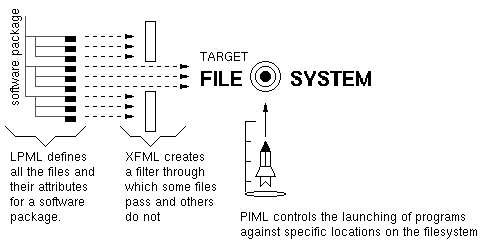(DOING THINGS YOU ONLY DREAMT ABOUT WHEN YOU WERE A KID)
|
Technical Tips for LPML Methods
(DOING THINGS YOU ONLY DREAMT ABOUT WHEN YOU WERE A KID) |
|
Note: you will need to use TAB values instead of spaces inside the listed Makefile's below; see http://www.gnu.org/manual/make/.
Contents
1.
Using LPML to quickly install files on a cluster of multiple computers
2.
Capturing all the WARNINGS and outputting
3.
The interactions between LPML, PIML, and XFML
#1. Using LPML to quickly install files on a cluster of multiple computers
Example scenario: output a network identification file to all the computers present within a cluster.
Solution: the following Makefile and hosts.xfml files work to implement the following.
# LPML TECH TIP Example #1a. Makefile NET_hosts_tab: make TIMESTAMP=`date +"%s"` METAMTARGET="TRANSPORT" \ MTARGET="hosts_tab" HOSTNAME="$(HOSTNAME)" lpmladm hosts_tab: TEST_hosts_tab cat hosts.lpml | \ perl xfml_parse.pl /home/user/hosts.xfml | \ perl lpml_parse.pl install $(CATEGORY) $(DIST) "$(SOURCE)" \ "$(TARGET)" > Makefile.install make -f Makefile.install directories make -f Makefile.install files @echo "If hosts.tab has changed, restart httpd and loncontrol:" @echo " /etc/rc.d/init.d/httpd restart" @echo " /etc/rc.d/init.d/loncontrol restart" lpmladm: @if (test $(METAMTARGET) = "TRANSPORT"); then \ echo "Transporting to $(HOSTNAME)"; \ sudo make DIST=$(DIST) CATEGORY=$(CATEGORY) \ SOURCE="$(SOURCE)" \ TARGET="lpmladm.$(TIMESTAMP)" \ NORESTORECONF="$(NORESTORECONF)" "$(MTARGET)"; \ cd lpmladm.$(TIMESTAMP); \ sudo tar czvf ../tarball$(TIMESTAMP).tar.gz .; \ cd ..; scp tarball$(TIMESTAMP).tar.gz \ lpmladm@$(HOSTNAME):~/tarball$(TIMESTAMP).tar.gz; \ ssh lpmladm@$(HOSTNAME) sudo mv tarball$(TIMESTAMP).tar.gz /; \ ssh lpmladm@$(HOSTNAME) sudo tar -x -z -v -C / \ -p --same-owner -f \ /tarball$(TIMESTAMP).tar.gz; \ ssh lpmladm@$(HOSTNAME) sudo rm -f \ /tarball$(TIMESTAMP).tar.gz; \ elif (test $(METAMTARGET) = "LAUNCH"); then \ echo "Launching process on $(HOSTNAME)"; \ LAUNCHSAVE=$(OUTSTREAM) $(SAVE); \ make DIST=$(DIST) CATEGORY=$(CATEGORY) SOURCE="$(SOURCE)" \ TARGET="$(TARGET)" NORESTORECONF="$(NORESTORECONF)" \ LAUNCH="$(LAUNCHSAVE)" "$(MTARGET)"; \ scp $(SAVE) lpmladm@$(HOSTNAME):~/$(SAVE); \ ssh lpmladm@$(HOSTNAME) sudo perl $(SAVE); \ ssh lpmladm@$(HOSTNAME) sudo rm -f $(SAVE); \ else \ echo "**** ERROR **** Incorrect METAMTARGET"; \ fi |
<!-- LPML TECH TIP Example #1b. hosts.xfml --> <xfml> <clause> <when:name match='/^source$/'> <when:cdata match='!/^loncom\/hosts\.tab$/'> <choice:exclude nodename='file' /> </when:cdata> </when:name> </clause> <clause> <choice:exclude nodename='fileglob' /> </clause> <clause> <choice:exclude nodename='link' /> </clause> <clause> <when:name match='/^targetdir$/'> <when:cdata match='!/^home\/httpd\/lonTabs$/'> <choice:exclude nodename='directory' /> </when:cdata> </when:name> </clause> <clause> <choice:exclude nodename='rpm' /> </clause> <clause> <choice:exclude nodename='specialnotices' /> </clause> </xfml> |
Note that the target (HOSTNAME) computer should accept RSARhostsAuthentication protocol over the secure shell from the computer you are entering the commands below on:
bash$ make HOSTNAME="somwhere.acomputerglows.com" NET_hosts_tab |
#2. Capturing all the WARNINGS and outputting
Notice that the make warningnote is called at the end of the install target.
# LPML TECH TIP Example #2a. Makefile
# Shows how the WARNINGS file can be tested after source-to-target installation
install: TEST_hosts_tab Makefile.install Makefile
echo -n "" > WARNINGS
make -f Makefile.install SOURCE="$(SOURCE)" TARGET="$(TARGET)" \
directories
make -f Makefile.install SOURCE="$(SOURCE)" TARGET="$(TARGET)" files
make -f Makefile.install SOURCE="$(SOURCE)" TARGET="$(TARGET)" links
make warningnote
warningnote:
@if (test -s WARNINGS); then \
W=`grep -c '\*\*\*\* WARNING' WARNINGS`; \
E=`grep -c '\*\*\*\* ERROR' WARNINGS`; \
N=`grep -c '\*\*\*\* NOTE' WARNINGS`; \
echo "---> $$W WARNINGS ENCOUNTERED! "; \
echo "---> $$E ERRORS ENCOUNTERED! "; \
echo "---> $$N NOTES ENCOUNTERED! "; \
echo "!!!!!!!!!!!!!!!!!!!!!!!!!!!!!!!!!!!!!!!!"; \
echo "!!!! Please read the WARNINGS file !!!!"; \
echo "!!!! to make sure everything is !!!!"; \
echo "!!!! correct and taken care of !!!!"; \
echo "!!!!!!!!!!!!!!!!!!!!!!!!!!!!!!!!!!!!!!!!"; \
fi
|
#3. The interactions between LPML, PIML, and XFML.
